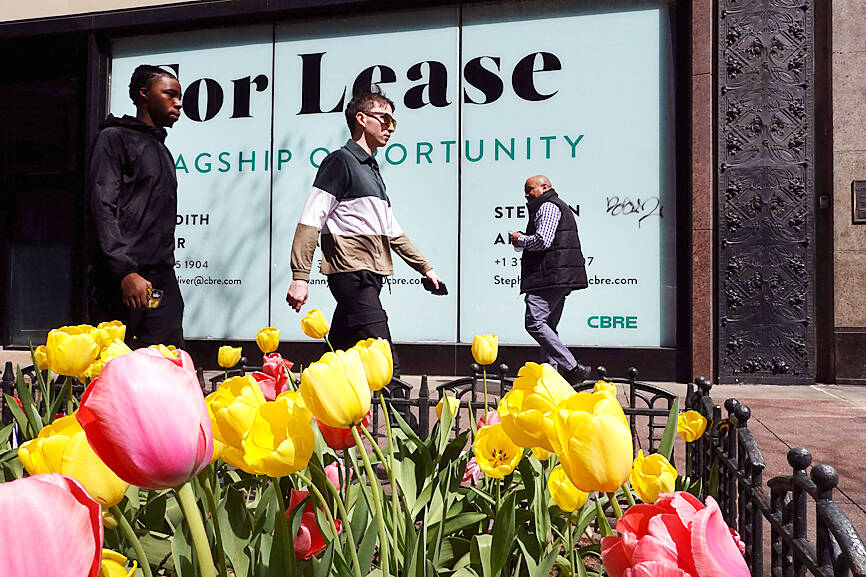Despite initial signs that price rises are slowing, retailers globally are still worried about inflation dampening consumer spending, a survey of retail decisionmakers conducted by Boston Consulting Group (BCG) showed.
In Europe, retailers are contending with slowing sales as consumers, squeezed by high energy bills, spend less on clothes and buy cheaper food.
Overall, the rising cost of goods, declining consumer spending and unpredictable supply chains were the top-ranked concerns for the 561 global retail executives, directors and managers surveyed by BCG for a report published yesterday as the World Retail Congress conference begins.

Photo: AFP
Passing higher costs on to shoppers is likely to become harder: 72 percent of respondents said they expected consumers to be more price-sensitive this year.
“This limits the options retailers have to recover and combat high input costs, and it creates new difficulties that retailers must combat, such as shifting consumer behavior towards specific products and customer segments,” BCG said in the report.
When buying groceries, for example, consumers in Britain have been prioritizing affordability over other qualities, with negative knock-on impacts on nutrition.
As well as hiking prices and renegotiating with suppliers, retailers are having to get creative to keep shoppers coming back, with many investing in loyalty programs, price promotions and improvements to the online customer experience, the survey found.
The authors of the report said retailers should invest in artificial intelligence (AI) to hone their pricing and marketing strategies using algorithms and machine learning.
“Most retailers outside Asia are neglecting AI and missing out on the potential additional benefits it offers,” they said.
Asia was a bright spot in terms of retailers’ expectations, with 76 percent of respondents expecting the region’s economy to grow this year after China’s reopening following lengthy COVID-19 lockdowns.
Retailers were more optimistic about North America than Europe, with 68 percent predicting growth in the former and 54 percent in the latter.

The US dollar was trading at NT$29.7 at 10am today on the Taipei Foreign Exchange, as the New Taiwan dollar gained NT$1.364 from the previous close last week. The NT dollar continued to rise today, after surging 3.07 percent on Friday. After opening at NT$30.91, the NT dollar gained more than NT$1 in just 15 minutes, briefly passing the NT$30 mark. Before the US Department of the Treasury's semi-annual currency report came out, expectations that the NT dollar would keep rising were already building. The NT dollar on Friday closed at NT$31.064, up by NT$0.953 — a 3.07 percent single-day gain. Today,

‘SHORT TERM’: The local currency would likely remain strong in the near term, driven by anticipated US trade pressure, capital inflows and expectations of a US Fed rate cut The US dollar is expected to fall below NT$30 in the near term, as traders anticipate increased pressure from Washington for Taiwan to allow the New Taiwan dollar to appreciate, Cathay United Bank (國泰世華銀行) chief economist Lin Chi-chao (林啟超) said. Following a sharp drop in the greenback against the NT dollar on Friday, Lin told the Central News Agency that the local currency is likely to remain strong in the short term, driven in part by market psychology surrounding anticipated US policy pressure. On Friday, the US dollar fell NT$0.953, or 3.07 percent, closing at NT$31.064 — its lowest level since Jan.

The New Taiwan dollar and Taiwanese stocks surged on signs that trade tensions between the world’s top two economies might start easing and as US tech earnings boosted the outlook of the nation’s semiconductor exports. The NT dollar strengthened as much as 3.8 percent versus the US dollar to 30.815, the biggest intraday gain since January 2011, closing at NT$31.064. The benchmark TAIEX jumped 2.73 percent to outperform the region’s equity gauges. Outlook for global trade improved after China said it is assessing possible trade talks with the US, providing a boost for the nation’s currency and shares. As the NT dollar

The Financial Supervisory Commission (FSC) yesterday met with some of the nation’s largest insurance companies as a skyrocketing New Taiwan dollar piles pressure on their hundreds of billions of dollars in US bond investments. The commission has asked some life insurance firms, among the biggest Asian holders of US debt, to discuss how the rapidly strengthening NT dollar has impacted their operations, people familiar with the matter said. The meeting took place as the NT dollar jumped as much as 5 percent yesterday, its biggest intraday gain in more than three decades. The local currency surged as exporters rushed to